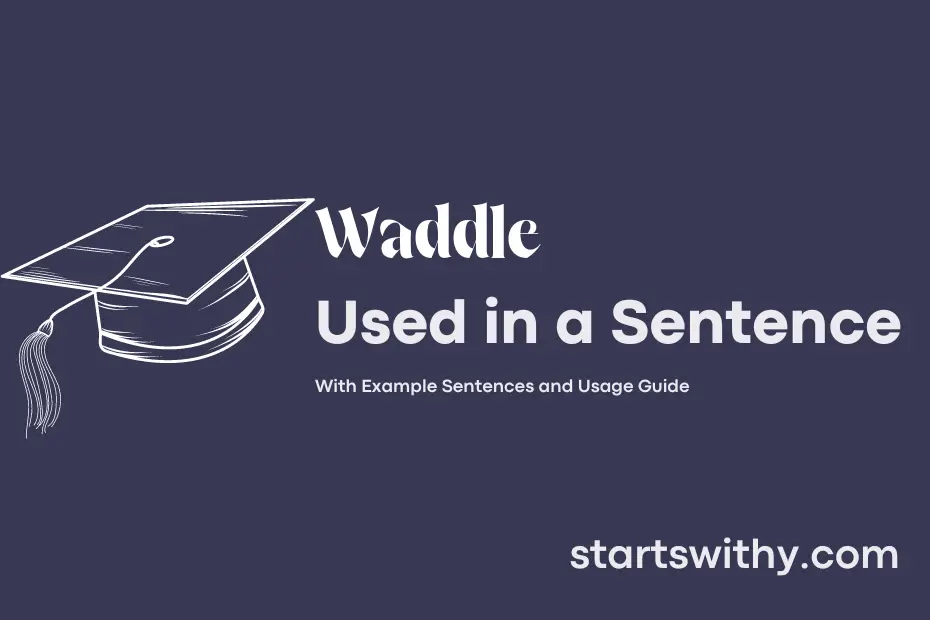Ever observed a penguin make its way across the ice? This charming waddle, characterized by side-to-side walking, helps us understand the term “waddle” in action.
In language, “waddle” refers to a distinctive way of walking where a person or animal moves from side to side, often with a swaying motion. This term captures a unique and endearing gait typically seen in certain creatures, adding a touch of whimsy to their movements.
7 Examples Of Waddle Used In a Sentence For Kids
- The duck waddles to the pond.
- The penguin likes to waddle on the ice.
- The baby ducklings waddle behind their mother.
- The cute puppy loves to waddle around the garden.
- The mommy duck teaches her babies how to waddle.
- The chubby little squirrel waddles over to the tree.
- The funny little quail waddles around the farm.
14 Sentences with Waddle Examples
- Waddle over to the cafeteria for some breakfast before class.
- After a long day of lectures, students often waddle back to their hostel rooms.
- I saw a group of ducks waddle across the campus garden.
- The tired students decided to waddle to the nearest tea stall for a quick pick-me-up.
- Despite feeling exhausted, the dance team managed to waddle to their practice session.
- The project group had to waddle through the library to find the necessary research materials.
- It’s always funny to see the penguins at the zoo waddle around.
- Due to heavy rain, the students had to waddle through the flooded paths on campus.
- The first-year students had to waddle through a maze of corridors to find their classroom.
- During the monsoon season, umbrellas were essential for students to avoid having to waddle in the rain.
- The dejected cricket team had to waddle back to the dorms after losing an important match.
- After a late-night study session, the tired group of friends could only muster the energy to waddle to the nearby food truck for dinner.
- The wildlife club organized a visit to a bird sanctuary where students could observe the birds waddle gracefully.
- With heavy backpacks filled with books, students often waddle as they make their way to the library.
How To Use Waddle in Sentences?
To use Waddle in a sentence, simply place the word in a context where it makes sense with the subject matter. Waddle is a verb that describes a movement that involves walking with short steps while moving unsteadily from side to side, resembling the motion of a duck.
Here are some examples of how to use Waddle in a sentence:
- The little ducklings began to waddle after their mother towards the pond.
- The penguin had to waddle quickly to keep up with the rest of the group.
- After the long hike, his legs felt like jelly, and he could only waddle back to the campsite.
- The toddler tried to waddle across the room in his oversized snow boots.
When incorporating Waddle into a sentence, consider the movement and mannerisms associated with the word. Visualize a slow, unsteady walk similar to that of a duck or penguin. This will help you accurately capture the essence of Waddle in your writing.
By adding Waddle to your vocabulary and using it in various sentences, you can enhance your descriptive language skills and bring a vivid image to your reader’s mind. Remember, practice makes perfect, so try incorporating Waddle into your daily writing to become more comfortable with using it effectively.
Conclusion
In conclusion, waddle is a verb that describes the awkward walking movement of certain animals like penguins, ducks, or other creatures that move with a side-to-side motion. These animals have a unique way of walking that sets them apart from others. Penguins waddle gracefully on land, while ducks waddle to the water. Observing animals waddle can be a delightful and endearing experience that showcases the diversity and charm of the natural world.
Next time you see a penguin or a duck making its way with a distinctive waddle, take a moment to appreciate the beauty and uniqueness of their movement. The waddle adds character to these animals and serves as a reminder of the fascinating behaviors found in the animal kingdom.



